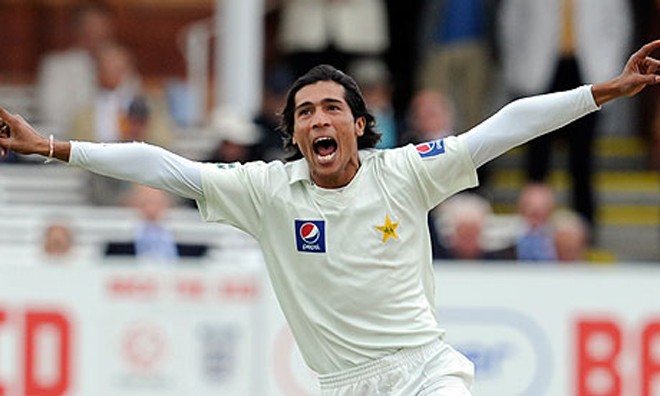
Mohammad Amir’s actions deserved punishment but his talent does not deserve to be banished

Mohammad Amir had it good till he threw it away. Prodigious talent, ambition and he managed to land the hardest job in the country: being a part of Pakistan’s pace attack. And then the story broke of his corrupt actions in league with Salman Butt and Mohammad Asif. As Amir tries to make his way back into the team, he is realising that dealing with an official ban was only half the battle as far as getting back into the team is concerned.
Life does not always give professional athletes second chances. Hundreds of them make a mistake or suffer an accident serious enough to shatter dreams and prospects.
Amir is enormously lucky that he is still under 25. His age has taken on some importance as his actions/crimes have been debated. When he was found guilty of spot-fixing, many argued that he should receive lenient treatment because of his age. But that argument was never attractive: we cannot celebrate a precocious prodigious talent as being gifted far beyond his year and then allow him to hide behind his age when he engages in corrupt practices. Amir knew fully well what he was doing and he was mighty sure that he would get away with it. Once he was caught, it was only fair that he faces full consequences. And now he has. So what is the fuss now?
Enter Messrs Hafeez and Azhar Ali. Both of them refused to train alongside Amir. The ban is now gone but the damage caused to Pakistan is the reason cited by both these players for boycotting Amir. Azhar Ali went the extra mile and resigned as skipper -- however the resignation was not accepted and Azhar Ali came around.
Apart from these two teammates of Amir’s, a number of people in Pakistan have said that Amir should not be picked because of the damage caused to Pakistan’s reputation. My contention is that while it is understandable that certain players do not want to play alongside Amir, there is absolutely no good reason for keeping Amir out of the national team.
Pakistan Cricket Board (PCB) missed a trick by not ensuring detailed counselling and preparation for Amir’s team-members once he was picked for the squad. The context is extremely important here: the players who play for our national cricket team are dreamers. Highly ambitious, driven and almost obsessed with playing for Pakistan. They don’t have it easy as players either -- considering we do not play any home games. Amir arrived as a sparkling talent, raised Pakistan’s profile and then he accepted money for spot-fixing. We were all shocked.
But imagine being a team-member who trained with him, lived with him, travelled with him -- all for Pakistan. If you were a team-member of Amir’s, you would be duly enraged at his actions. Our players lived through the ignominy suffered by Pakistan cricket because of Amir. So their grievance is very personal and heartfelt. It should not be dismissed lightly. But such grievances, while understandable, do not in any way deserve acceptance or serve as a justification for excluding a person who has paid his dues.
The players’ anger makes sense to me but they must get over it. Then there are those former cricketers or members of the public who do not want Amir to be selected because he made one serious mistake. This is ridiculous and must be called out as being so.
Notice the difference between the Azhar/Hafeez argument and the general public’s: Azhar and Hafeez said that they would not play in a team in which Amir played. But the public’s argument asks for Amir to be excluded from the team. The players, Amir’s team-mates, still had the better argument: you are free to not play if you have a conscientious objection. But you cannot call for ignoring Amir as a player. His crime was serious and he, more than anyone else, realises the cost that he had to pay. He has served his sentence and we must all move on now.
It is important to remember that none of us should be condemned for life because of our least flattering actions. No one deserves to be labelled a particular way because of her worst actions.
Amir’s case also serves as a powerful reminder that the law has a complex relationship with notions of morality. The fact that the legal ban and jail sentence came to an end for Amir would not and does not solve the issue for the general public. Morality matters and one must engage with it. And if morality matters then it should be remembered that our refusal to give a cricketer a second chance would serve no moral purpose. Making an example out of Amir is not powerful as an argument since he has already been made an example of: there is no reason to deny him his place.
We should also remember the sheer hypocrisy of initiating moral crusades against a cricketer while conveniently looking the other way when much greater crimes are committed in this country -- or in its name. I am not suggesting that people should be allowed to be corrupt because others are. My point is that when we invoke moral reasons for boycotting someone who has already faced the process of law, the moral reasoning must be consistent -- otherwise it is just a façade to advance certain ends. An inflation of moral reasoning without regard for its consistency undermines morality and moral reasoning itself.
Mohammad Amir realises how his actions hurt our game and his country. He has paid his dues. His actions deserved punishment but his talent does not deserve to be banished. We must welcome him back and oppose those who argue otherwise.